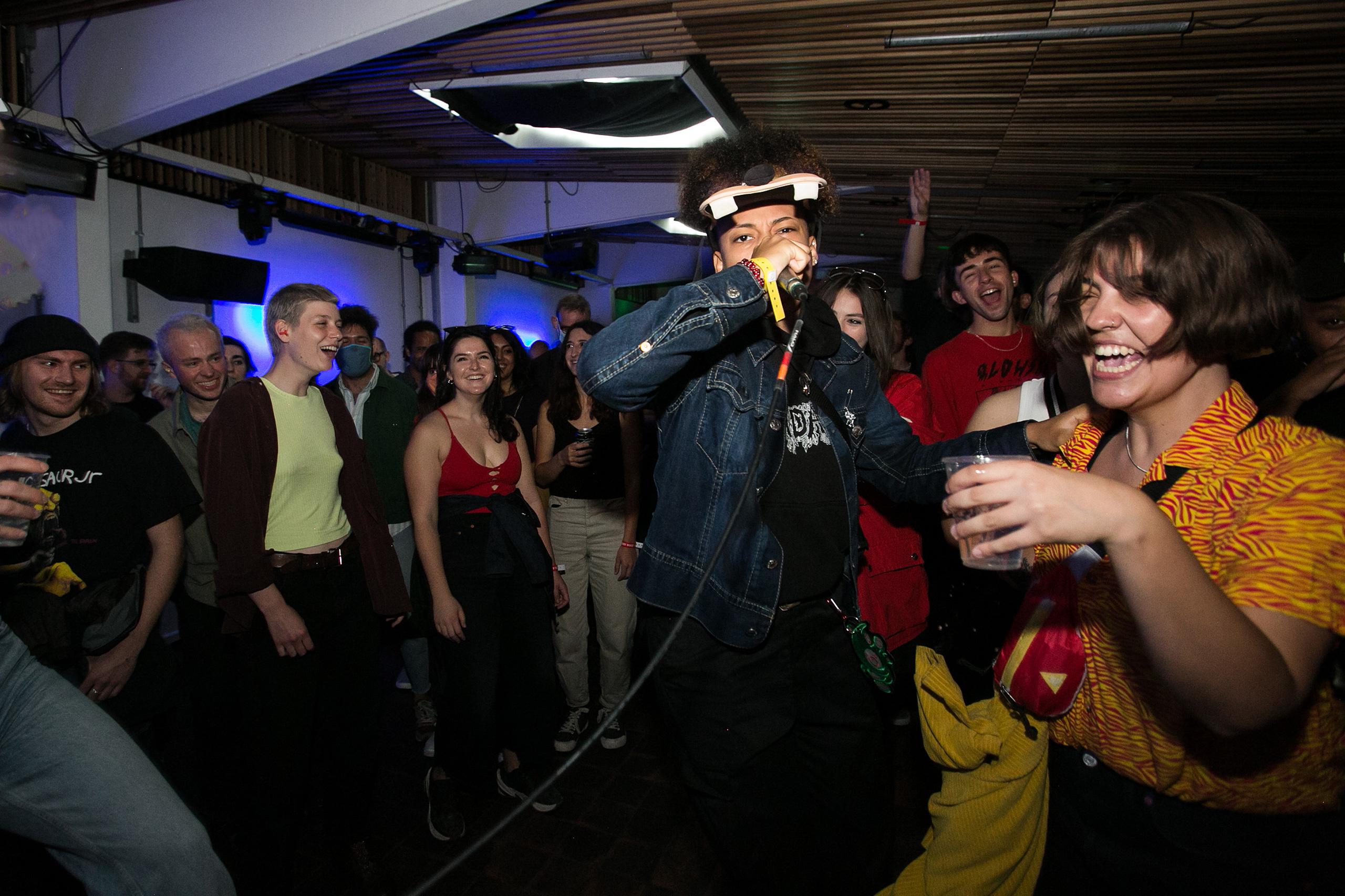Visions 2021 was a mix of experiences, sounds and juxtapositions which were both unique and brilliant
It might have been scaled down, but this was the most appreciated edition of Visions yet

Hands thrown in the air, heads back, eyes closed. Sweating, swaying, moving. The familiar but long-forgotten sensation of tacky beer on the soles of your shoes. Empty cups rolling. Nostalgic ’80s synth melodies rise and fall, the kick drum providing a hypnotic anchor. A fierce energy in the eyes of Porridge Radio’s lead singer and songwriter Dana Margolin, her voice still rasping from the last song’s desperate chorus.
So is the headline set of the 2021 Visions festival. For many, this is the first live music event they’ve been able to attend in 18 months. The air is thick with anticipated excitement. Throwing all caution to the wind, the audience leave all traces of lockdown behind, fighting to get as close to the stage as possible.
The festival is running on a slightly smaller scale than in previous years, and in an effort to minimise the spread of Covid, every attendee is asked to bring proof of a negative lateral flow test; those who didn’t have proof were asked to take a test there and then on site. We then have our temperature taken before being granted a wristband.
This year, Visions spans across three venues in East London (two fewer than normal), and each venue runs at a slightly reduced capacity. Having said that, once in, the rooms feel packed and the energy is high, bubbling with conversation and buzzing at the thrill of being back in a crowd.
Oval Space functions as the main stage. Up the stairs, past the outdoor balcony bar, and into the room, with windows overlooking the Regent’s Canal and its dramatic gasholders, it’s a venue that gives a striking reference to pre-industrial Victorian London. Inside it’s all grey concrete flooring and whitewashed walls, with purple strobe lighting illuminating Girl Ray as they fill the space with arpeggiators and synthesisers. The silky soft-pop vocals are occasionally interspersed with a Kraftwerk-esque vocoder, giving a hint of something extraterrestrial.
Next, I head to Pickle Factory, whose lineup celebrates predominantly Black artists throughout the course of the day, ranging from Kai Kwasi‘s spellbinding sample-based bedroom pop, to high-energy experimental rap from both Grove and Flohio, and Falle Nioke‘s percussion-based, Guinean-inspired electronic music. The room, with its wooden ceiling and exposed brick floor, is packed wall-to-wall all day, in reverence to the live music culture that has been so deeply missed for the last year.
A short walk through Bethnal Green takes me to the third venue, a beautiful red brick building embedded within a surrounding council estate. The Bethnal Green Working Men’s Club is a new site for this festival, and it really is what it says on the tin. Inside, it’s the the kind of venue where you’d usually go for cheap pints and bingo. The stage is lit up by a giant love heart, big multicoloured bulbs glowing cheekily from behind the the musicians’ heads. The walls are decorated with gold foil tinsel curtains, and a disco ball gently spins. It feels like both a time and location warp. We could just as well have stepped into a village hall in a remote part of Wales in the 1960s. Or Sheffield, or Newcastle, or Glasgow. The space beautifully facilitates a coming-together; of friends, of musicians and their audiences, and of two very different worlds, allowing the modern and experimental art world to exist in a space so deeply rooted in a time long gone by.
South London’s Wu-Lu takes to the stage here, changing the atmosphere and seamlessly embracing a cross-genre soundscape of heavy rock guitar, subtle jazz, grunge beats and soft, textural vocals. The overall effect is an ebbing and flowing of highly dynamic, passionate and loud walls of sound, and sections of drifting, meandering hypnosis. The sound engineer immaculately follows the natural dynamic contours of the music, softer sections gradually rising and building into immersive full body waves of vibration.
The line up for this stage is a highly eclectic mix of cultures and musical backgrounds. There’s caroline – an eight-piece band who’s bedroom post-rock is reminiscent of early Yndi Halda, with the soulful addition of trad folk vocals – R&B experimentalist GAIKA, and Folly Group, who introduce an injection of energetic indie rock, thick with percussion and heavy vocals. Loraine James headlines this stage, bringing together influences from jazz, electronica, UK drill and grime.
Following Yard Act‘s performative (and totally captivating) critique of the British class system, Billy Nomates opens her set with the lyric “No is your greatest resistance.” Alone on stage with a backing track, it really is remarkable how she so completely manages to captivate her audience, via her use of driving bass lines, heavy sub synths and incredibly catchy melodies, sung in a thick American accent, with a notable hint of country. It shouldn’t work but somehow it does, probably due to her sheer passion on stage. Arms reaching and body bending, her quirky dancing to her own music is at once bizarre and very, very contagious.
Visions 2021 is a mix of experiences, sounds and juxtapositions which are both unique and brilliant. It feels as though it isn’t just the musicians who’ve been rehearsing for this day; the organisers clearly have, with a lineup that’s so carefully curated, and it even feels like we, the audience, have rehearsed too. After so many months deprived of live music events, Visions is attended by all with greater focus. In comparison to memories of “life before Covid”, we come with a little more appreciation, a little more passion and a little more love.